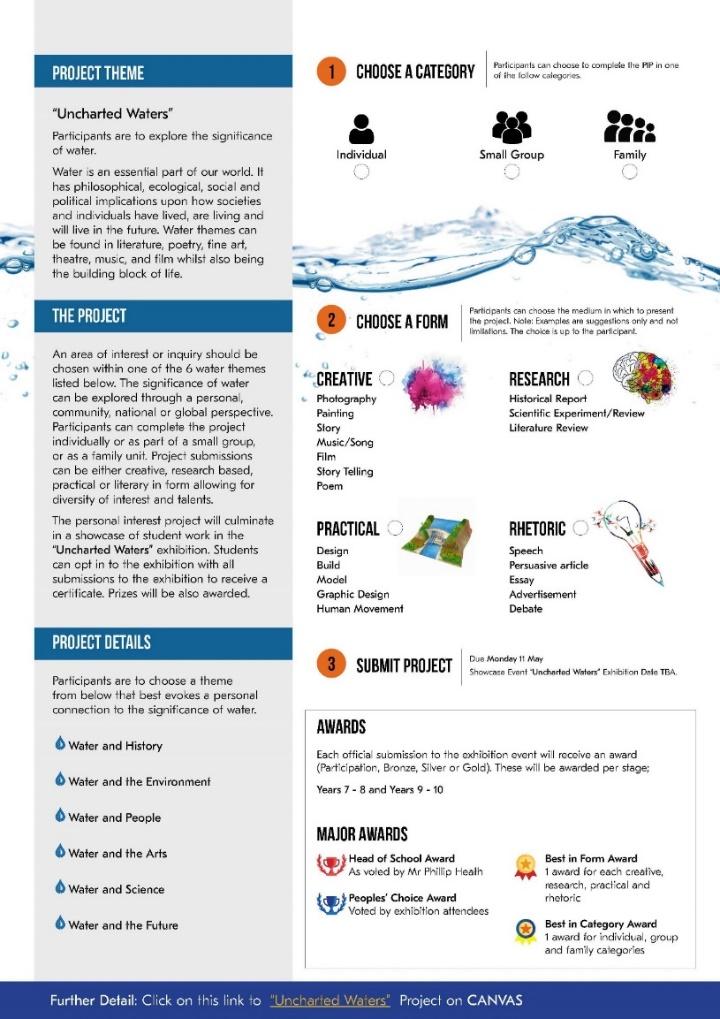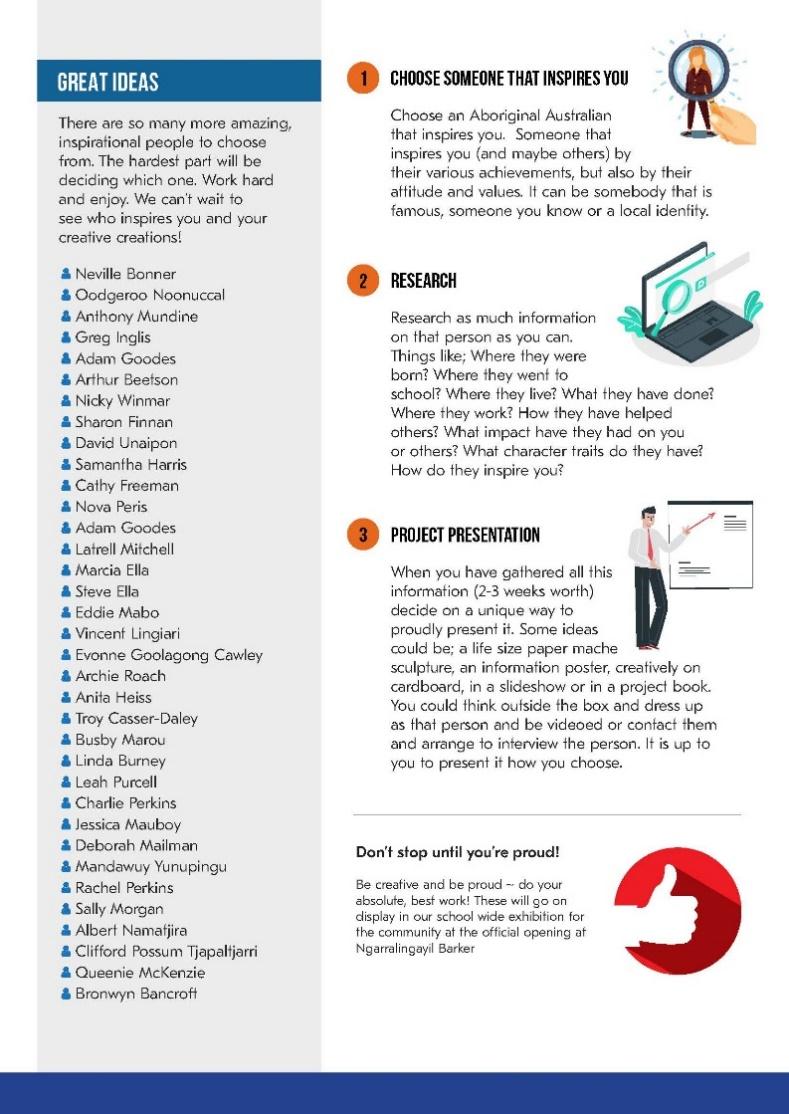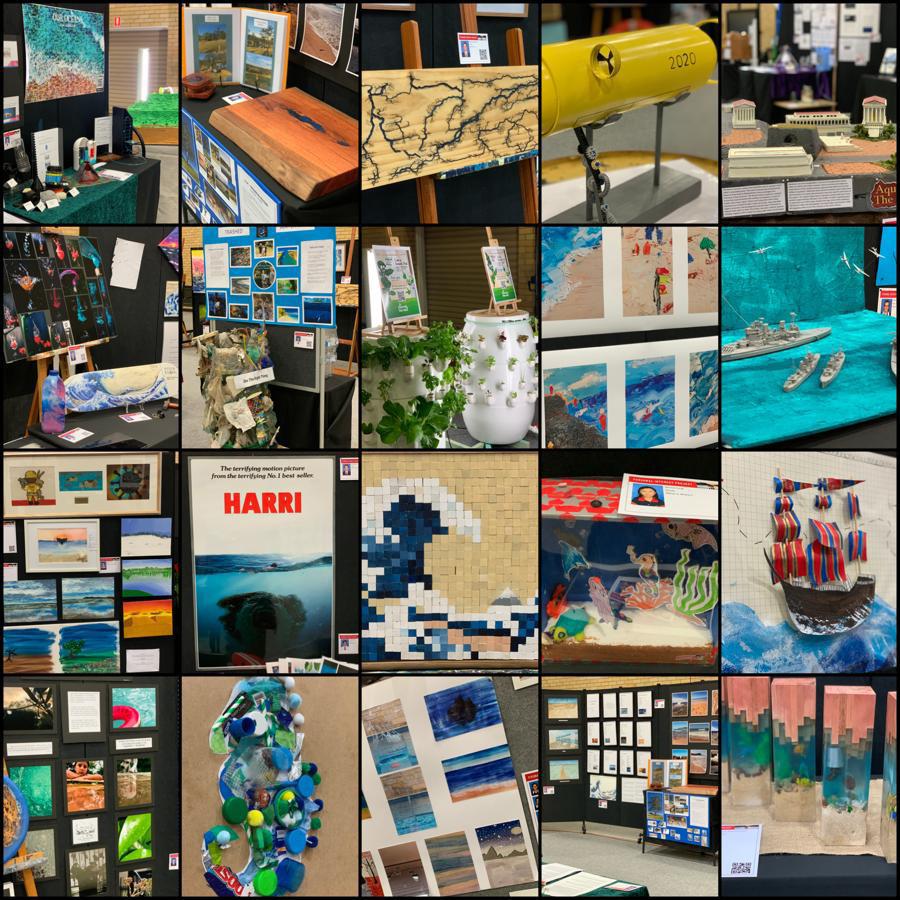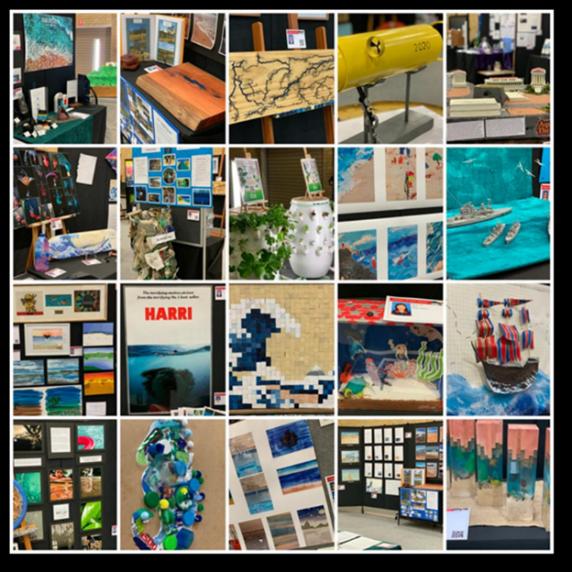
20 minute read
Unchartered Waters: A whole school personal interest project during a pandemic Sarah Clifton
Unchartered Waters: A whole school personal interest project during a pandemic
Sarah Clifton Director of Professional Learning
Abstract
The COVID-19 pandemic has caused educators globally to rethink teaching. At the height of NSW government social isolation restrictions, the school executive made a decision to create a re-imagined 2020 calendar that included a five-week break over April and May. During this time, students from Pre-K to Year 10 were invited to undertake a personal interest project. The aim was to take the opportunity of uninterrupted time to create a learning experience that under normal circumstances would be difficult, due to the confines of school and curriculum structures. This article captures the process, result and recommendations of the ‘Unchartered Waters’ personal interest project.
Key terms Inquiry In education, inquiry is an approach to learning that involves the learner exploring the world through observing, asking questions, searching for answers and testing theories.
Body The Design
The process began with the formation of a team of five curriculum leaders including the Head of Curriculum, Director of Teaching and Learning, Director of Professional Learning, Deputy Head of the Junior School and a Digital Learning Leader to prepare and lead the implementation of the initiative.
As the personal interest project (PIP) was to be completed during what was officially school holidays, it needed to take a different direction to how most educators would usually design such a project. The differences were necessities, however also presented an exciting opportunity to offer a learning activity with very different processes and assessment. There would be no grades attached and the project was not related to academic attainment. The underlying criteria in the design was therefore to encourage interest and engagement for students and families to take part in the project during holidays. How could a project be designed to capture the intrinsic desire to learn? The project was designed based on the following concepts;
Topic: The chosen topic needed to be broad enough to capture interest for all.
Form: There needed to be freedom of choice in the form that the project would be presented so that students could utilise their strengths and interests.
Independent or collaborative: Students given the choice to work either independently or collaboratively. The unique situation also provided an opportunity to learn together as a family.
Support: Students needed to have access to support whilst completing the project. Staff voluntarily nominated to be mentors.
The project –‘Unchartered Waters ’
The broad topic of water was chosen. The Junior School shaped their topics in stages based on the PYP framework. Pre K – 1 What is water, Years 1 and 2 Water is in our world, Years 3 and 4 Water is shared by living things, Years 5 and 6 The power of water.
In the Secondary School, six themes were constructed: Water and the Arts, Water and People, Water and History, Water and the Environment, Water and Science and Water in the Future.
Darkinjung Barker and Ngarralingayil Barker, Barker’s two schools uniquely supporting Indigenous students, decided to pursue the theme ‘Inspirational People’.
The Project - Junior School
Project Theme
“Unchartered Waters”
An inquiry into water. Water is an important part of our world. It has philosophical, ecological, social and political implications upon how societies and individuals have lived, are living and will live in the future. Connections to water can be found in literature, poetry, fine art, theatre, music, and film whilst also being the building block of life.
The PROJECT Details
An inquiry into the importance of water. Participants can complete the project individually or as part of a small group, or as a family unit. Project submissions can be either creative, research based, practical or literary in form allowing for diversity of interest and talents. The Personal Interest Project will culminate in a showcase of student work in the “Uncharted Waters” exhibition. Students can opt in to the exhibition with all submissions to the exhibition to receive a certificate.
Prizes will be also awarded.
AWARDS
Each official submission to the exhibition event will receive an award (Participation, Bronze, Silver or Gold). These will be awarded per stage; Years Pre-K - K, Years 1-2, Years 3-4, Years 5-6,
MAJOR AWARDS
Head of School Award As voted by Mr Phillip Heath
Peoples’ Choice Award Voted by exhibition attendees
Best in Form Award 1 award for each creative, research, practical and literature
Best in Category Award 1 award for individual, group and family categories
CENTRAL IDEA
Pre-K and Kindergarten Central Idea: What is water? Think about Water is all over the Earth Water is important Water is used everyday Key Concept: Form (What is it like?)
Year 3 and Year 4 Central Idea: Water is shared by living things Think about The use of water Living things need water The importance of clean water Key Concept: Reflection (How do we know?) Year 1 and Year 2 Central Idea: Water is in our World Think about The water cycle What does a drop of water weigh? Time to save water Key Concept: Function (How does it work?)
Year 5 and Year 6 Central Idea: The power of water Think about The use of water Different states of water What is the future of water Key Concept: Perspective (What are the points of view?)
1 Choose a category
Read the Central Idea and Think About. Complete the PIP in one of the follow categories.
Individual Small Group Family
2
How will you exhibit your work? CREATIVE
Photography Painting Drawing Music/Song Film/Movie Animation Sculpture
RESEARCH
Historical Report Scientific Experiment Review Literature Review
PRACTICAL
Design Build Model Graphic Design Human Movement
Literature
Story Poem Persuasive Article Picture Book Autobiography
3 SUBMIT PROJECT
Due on Return to School – Monday 11th May Showcase Event “Unchartered Waters” Exhibition Date TBA.

Further Detail: Click on this link to “Unchartered Waters” Project on CANVAS
Figure 1: The Junior School (Pre-K to Year 6) PIP one-page information sheet
The Project – Secondary School
Project Theme
“Uncharted Waters”
Participants are to explore the significance of water.
Water is an essential part of our world. It has philosophical, ecological, social and political implications upon how societies and individuals have lived, are living and will live in the future. Water themes can be found in literature, poetry, fine art, theatre, music, and film whilst also being the building block of life.
The project
An area of interest or inquiry should be chosen within one of the 6 water themes listed below. The significance of water can be explored through a personal, community, national or global perspective. Participants can complete the project individually or as part of a small group, or as a family unit. Project submissions can be either creative, research based, practical or literary in form allowing for diversity of interest and talents. The personal interest project will culminate in a showcase of student work in the “Uncharted Waters” exhibition. Students can opt in to the exhibition with all submissions to the exhibition to receive a certificate. Prizes will be also awarded.
Project Details
Participants are to choose a theme from below that best evokes a personal connection to the significance of water.
Water and History
Water and the Environment
Water and People
Water and the Arts
Water and Science
Water and the Future
1 Choose a category
Participants can choose to complete the PIP in one of the follow categories.
Individual Small Group Family
2 Choose a form
CREATIVE
Photography Painting Story Music/Song Film Story Telling Poem

PRACTICAL
Design Build Model Graphic Design Human Movement
Participants can choose the medium in which to present the project. Note: Examples are suggestions only and not limitations. The choice is up to the participant.

RESEARCH
Historical Report Scientific Experiment/Review Literature Review
Rhetoric
Speech Persuasive article Essay Advertisement Debate
3 SUBMIT PROJECT
Due Monday 11 May Showcase Event “Uncharted Waters” Exhibition Date TBA.
Awards
Each official submission to the exhibition event will receive an award (Participation, Bronze, Silver or Gold). These will be awarded per stage;
Years 7 - 8 and Years 9 - 10
Major Awards
Head of School Award As voted by Mr Phillip Heath
Peoples’ Choice Award Voted by exhibition attendees Best in Form Award 1 award for each creative, research, practical and rhetoric
Best in Category Award 1 award for individual, group and family categories
Further Detail: Click on this link to “Uncharted Waters” Project on CANVAS
Figure 2: The Secondary School (Year 7+) PIP one-page information sheet
GREAT IDEAS
There are so many more amazing, inspirational people to choose from. The hardest part will be deciding which one. Work hard and enjoy. We can’t wait to see who inspires you and your creative creations!
Neville Bonner Oodgeroo Noonuccal Anthony Mundine Greg Inglis Adam Goodes Arthur Beetson Nicky Winmar Sharon Finnan David Unaipon Samantha Harris Cathy Freeman Nova Peris Adam Goodes Latrell Mitchell Marcia Ella Steve Ella Eddie Mabo Vincent Lingiari Evonne Goolagong Cawley Archie Roach Anita Heiss Troy Casser-Daley Busby Marou Linda Burney Leah Purcell Charlie Perkins Jessica Mauboy Deborah Mailman Mandawuy Yunupingu Rachel Perkins Sally Morgan Albert Namatjira Clifford Possum Tjapaltjarri Queenie McKenzie Bronwyn Bancroft
1 Choose Someone that inspires You
Choose an Aboriginal Australian that inspires you. Someone that inspires you (and maybe others) by their various achievements, but also by their attitude and values. It can be somebody that is famous, someone you know or a local identity.
2 Research
Research as much information on that person as you can. Things like; Where they were born? Where they went to school? Where they live? What they have done? Where they work? How they have helped others? What impact have they had on you or others? What character traits do they have? How do they inspire you?
3 Project Presentation

When you have gathered all this information (2-3 weeks worth) decide on a unique way to proudly present it. Some ideas could be; a life size paper mache sculpture, an information poster, creatively on cardboard, in a slideshow or in a project book. You could think outside the box and dress up as that person and be videoed or contact them and arrange to interview the person. It is up to you to present it how you choose.
Don’t stop until you’re proud!
Be creative and be proud ~ do your absolute, best work! These will go on display in our school wide exhibition for the community at the official opening at Ngarralingayil Barker
v
Figure 3: The Darkinjung and Ngarralingayil Barker (Indigenous campuses) one-page PIP information sheet.
Participation
1105 students chose to participate producing over 700 individual, group and family submissions. Allowing for disruption and difficulties due to COVID-19 management plans, there were still 620 adults who were able to attend the project exhibition.
The student interest and community response to the project was overwhelming. Much time and effort had been given. The excitement surrounding the project meant that a showcase of the diversity of talent, interest and emotions depicted by the projects was a necessity.
Owing to the continued social isolation restrictions, a delay on physical project submissions was required. Therefore, a two-minute video of each project was requested as the first point of submission. The overview videos made the quantity and quality of student PIPs evident. These videos became an important element of the showcase.
The exhibition was held over five days at the start of June with projects displayed in a large indoor facility at the School. Exhibition sessions were designed to allow bookings for 10 adult guests at a time to comply with NSW health regulations. Sessions were booked out by the second day. With the easing of social restrictions, bookings for up to 20 adults per session were enabled for the final few days of the exhibition.
All Junior School classes were allocated a time to view the exhibition and the exhibition was open to Secondary School students during recess and lunch times.
The exhibition displayed art works, woodwork, models, hydroponics, aquariums, posters, research papers, scientific experiments, poetry, fiction, and computer-aided designs. Coded computer games, movies and websites were displayed on screens whilst musical compositions were played through the sound system.
Student projects were accompanied with a name card that included a photo, the project theme and the year group. It also incorporated a QR code that linked any video submission including the two-minute video overview to the project so that attendees could view the video to understand more about the project. Whilst time consuming to create, this added a fantastic dimension to the exhibition.
A virtual tour of the exhibition was also created and shared with the Barker community which can continue to be viewed at the following link: https://t.co/z8LQhxLqTN.

Figure 4: A collage of various student works on the theme Uncharted Waters

Feedback
The exhibition was well received by all in the School community including staff, students and parents. Below is a sample of comments from the guest book that demonstrate three themes including: how impressed attendees were with the quality of student projects, that they were thankful to the school for the initiative, and how they were inspired by this way of learning.
‘Very emotional and wonderful experience to see so many beautiful projects under one roof.’
‘Well done to all the young people who participated. Great to see the depth of curiosity and creativity. Wouldn’t it be great if school were always like this! Thank you’
‘What a privilege to see the creations of the students. It made the best out of this unprecedented challenge for us all. Well done.’
‘What an amazing exhibition! The creativity and effort is staggering! Well done to all the students for their work and to the Barker staff for setting up this exhibition. Fantastic!’
‘This was awe inspiring to see the projects from pre-K-10, the sheer amount of effort put into these projects.’
‘Really fascinating exhibition showing lots of diversity of thought and ideas. Thank you for all the hard work putting this together.’
‘We have been blown away by the creativity and thoughtfulness of every project. A big thank you to all the students for giving us such a feast of information and art.’
‘Such a wonderful initiative – the work is heartfelt and amazing.’
‘Congratulations to all the students and parents. I do believe this exhibition could stay as a permanent exhibition as there is so much incredible and important information in this room. INCREDIBLE! So very glad we were able to see it. Bravo! And thank you Mr Heath for your vision.’
‘Amazing efforts by all participants. We are totally in awe of the creativity displayed by the exhibits in all disciplines. This is an excellent idea to enable each to pursue his or her individual interest and display talents and persistent effort. Thanks to Barker for making this stimulating and enlightening exhibition possible.’
‘I am blown away by the creativity, imagination and artistic ability of our children. The world is in very good hands and the future looks great.’
‘Astonishing work in concept, variety and execution. Well done in challenging us.’
Judging
It was a difficult task to judge the projects. They were diverse and personal. Unlike the usual school projects, there were no specific criteria. This added to the project. Intrinsic reward was provided through the quality completion of each project and the pride that came from such effort. Nevertheless, judging needed to occur.
Three prominent guest judges including current and former members of the School Council spent hours admiring the students’ work and selecting projects for major awards. Staff also selected projects, as experts of their discipline, for awards. All projects were seen, watched, heard, explored, or read. Every participant received a certificate.
Discussion
While there is no doubt that this project was unique to the circumstances of an extended school holidays during a disrupted school year, there were many factors that contributed to its success, which can inspire future initiatives in schools.
Some potential reasons for the success are suggested below.
Choice: The project allowed freedom of choice. The topic of water was broad. Students were able to link water to a particular passion or interest. There was choice in how the project was completed that enabled students to use and demonstrate their strengths. For instance, students composed music, designed models, used digital imagery, coded games, submitted paintings, drawings, built models, completed woodwork, wrote research papers, made movies, took photos or made bike tracks. There was also choice to work independently, in a group with peers, or with family members.
Family support in learning: There is no doubt that families being at home together with parents working from home, was a huge factor in the success of the project. Having parent involvement,
interest and even teaching their children skills enhanced the quality of project submissions. Families also commented that the PIP was a positive learning experience that enabled them to support their children in a more productive way than was possible in online learning.
Uninterrupted time: The five-week period was time without the usual commitments. No social gatherings, no co-curricular and no dining out or shopping. Therefore, time could be directed towards the PIP.
Communication from the Head of School: The project was well communicated to families by the Head of School. This recommendation to participate in the PIP added gravitas to the project. Many parents have expressed their gratitude for this direction by the school that gave them something positive to focus on during the extended time at home.
Staff leadership and voluntary staff collaboration: The voluntary collaboration of capable and committed staff across the school made the project and the exhibition possible.
No grade attached: There is something wonderful about students participating intrinsically in learning purely for enjoyment. For projects to not be tied to any criteria, enabled complete freedom to explore interest areas and direction without limitation.
Recommendations
While this article serves as a celebration of the 2020 PIP and provides a guide for educators seeking to undertake similar initiatives, there are also lessons that can be learned for future learning experiences in a typical classroom environment. The following recommendations for all manner of future learning experiences have been provided.
Parental involvement in learning ‘The underlying assumption of teacher-parent collaboration is that everyone who has a stake in a child’s life, including the parents and teachers, should work together to give that child the best education possible.’ (Adams et al. 2016, p. 26). This was highlighted through the quality of the personal interest project submissions.
A strength of the Barker parent community is the interest that they take in their children’s learning. In a meta-analysis of parent influence on academic achievement Boonk et al. (2018). Summarised the most consistent and positive relations were found for: (a) reading at home, (b) parents holding high expectations/aspirations for their children’s academic achievement and schooling, (c) communication between parents and children regarding school, and (d) parental encouragement and support for learning.
It was also suggested by Boonk et al. (2018, p. 184) that:
As children grow older it is more important that parents create the conditions under which academic success can be fostered by setting high academic expectations and creating a comfortable space for them to develop their academic motivations in ways not considered intrusive or controlling.
We need to think more about how we can further include our parents in our learning programs. How can we further engage our parents in supporting learning at home? What skills can we equip them with? What communication can we provide? How do we do this whilst also helping our students become independent self-learners?
Uninterrupted learning time In a literature review on the effect of extracurricular activities on achievement Tanner (2017, p. 162) suggests that whilst extracurricular activities may have a positive effect on academics, especially when they contribute to a balanced life, self-confidence, and feelings of belonging, they may have a negative effect when they produce an overloaded personal schedule if the student is left with insufficient time and energy to devote to academics.
In the world that is a large, busy, independent school like Barker, where learning comes in many forms, do we provide enough uninterrupted time for students to focus on academics? Do we have the balance right? How can we evaluate the time demands on our students and the learning that is gained from these other experiences with the impact that is has on academic rigour, inquiry and achievement?
Reducing emphasis on grades and assessments COVID-19 has demonstrated how heavily learning is attached to grading. In current circumstances, equitable grading has become difficult and has forced educators to look for alternative options. This has led some advocates to push to make some of the changes last. Adam Rosenblatt, Associate Professor of the Practice in International Comparative Studies at Duke University, wrote in the Duke Chronicle (2020):
As soon as students are doing their work without feeling like they have to guess what the professor is looking for in order to get a good grade, they start doing wonderful things. They are more likely to take risks, collaborate, suggest creative formats and approaches and reveal important pieces of themselves.
This too was the experience of Unchartered Waters.
It may be that too much of what happens at school is based on assessment tasks and grades for reports. What can we do in our learning programs, particularly in the Middle School, so that student motivation is less attached to assessment grades?
Student choice ‘Choice leads to an increase in intrinsically motivated behaviour. The perception of an increase in autonomy seems to be a strong catalyst of an engagement in learning’ (Schneider 2018, p. 171).
Whilst student choice is becoming a greater focus of the curriculum and pedagogy, a greater emphasis needs to be had on providing students with some elements of choice. How can we allow more freedom of choice in how students demonstrate their understanding of concepts but still meet the outcomes and teach the required skills?
Conclusion
The Uncharted Waters initiative was unprecedented. It can be celebrated as an inspired innovative learning opportunity for students with their families that not only made the most of a unique and difficult year, but modelled how innovation can disrupt the normal expected phases of schoolbased learning with highly successful results. There are many lessons to be learnt and these must not be overlooked for future learning. What it most clearly demonstrated though was what young people can do when a highly relevant and engaging learning opportunity is combined with a positive, supportive and uninterrupted learning environment. We must find ways to provide students with opportunities within the day-to-day curriculum to display the diversity of talent, skills and interests that were showcased by this project. The challenge of how this can be done should be a focal point for schools.
Acknowledgements
Thank you to the Curriculum leadership team who oversaw the initiative including Jeremy von Einem, Greg Longney, Voni Howard and Andy Mifsud. Thank you also to Pia Midgley for her leadership in the organisation of the exhibition along with support from Tara Van Drempt, Virginia Ellis, Maddy Burton and the Visual Arts’ Team. Thank you to the Maintenance and Communications teams and the Print Room staff for their support and efficiency.
References
Boonk, L, Gijselaers, HJM, Ritzen, H & Brand-Gruwel, S 2018, ‘A review of the relationship between parental involvement indicators and academic achievement’, Educational Research Review. http://dx.doi.org/10.1016/j.edurev.2018.02.001.
Rosenblatt, A 2020, ‘Committing to ungrading, in an emergency and after’, Duke Chronicle, 26 March 2020, viewed 1 September 2020, https://www.dukechronicle.com/article/2020/03/duke-university-gradincoronavirus-covid-19-public-health-crisis-emergency-thinking-ungrading-pass-fail.
Schneider, S, Nebel, S, Beege, M & Rey, GD 2018, ‘The autonomy-enhancing effects of choice on cognitive load, motivation and learning with digital media’, Learning and Instruction, vol. 58, pp. 161-172. Chemnitz University of Technology, Straße der Nationen 12, 09111, Chemnitz, Germany.
Tanner, B 2017, ‘Effects of Extracurricular Activities and Physical Activity on Academic Success’, The BYU Undergraduate Journal in Psychology, vol. 12, no. 2, art. 16, pp. 159 – 180, BYU Scholars Archive, 2017.

